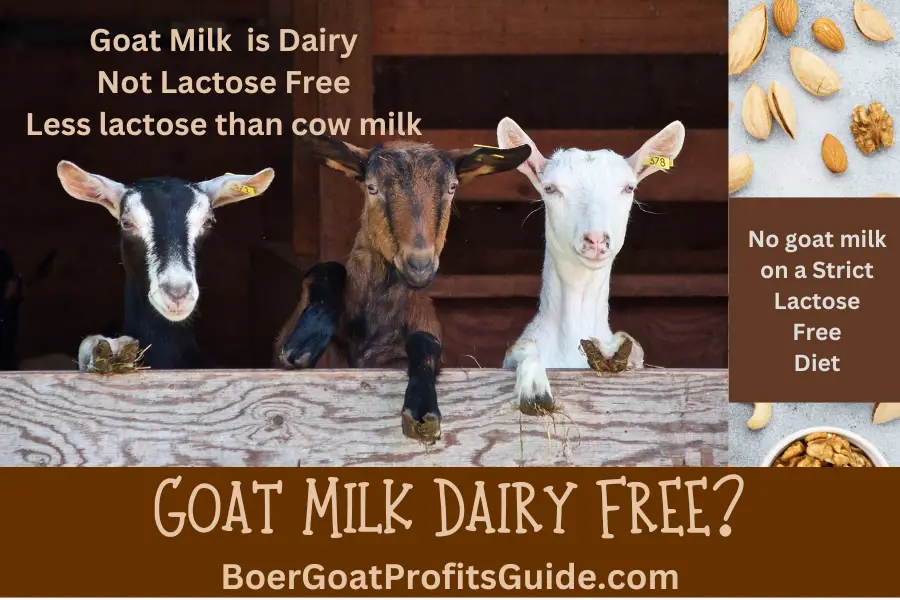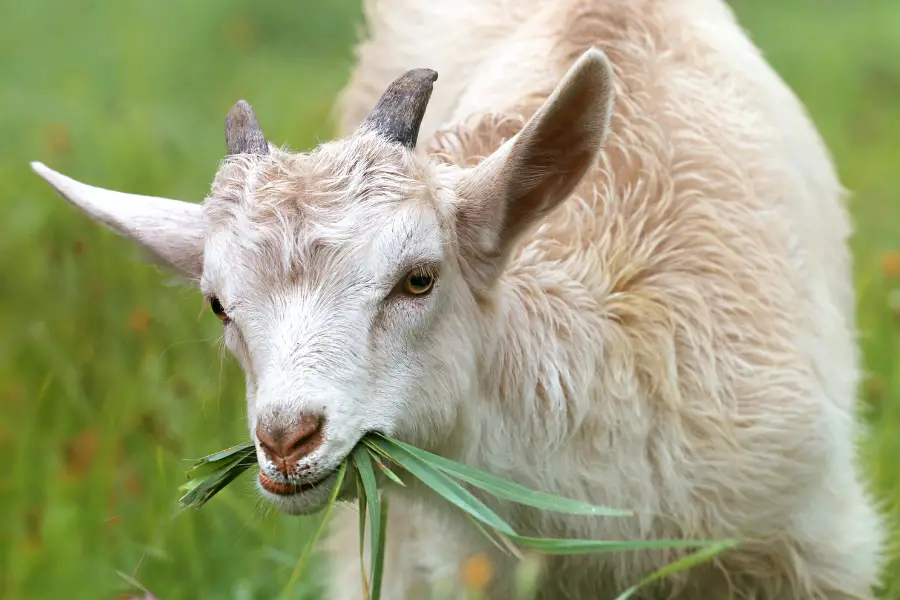
Goat’s milk has gained popularity as an alternative to cow’s milk, particularly among those who experience lactose intolerance or are looking for a dairy-free option. While still technically considered dairy because it is produced from a mammal, goat’s milk offers unique qualities and benefits that set it apart from traditional cow’s milk. With its easier digestibility, reduced allergens, and lower lactose content, many individuals are turning to goat’s milk to enhance their diets and maintain a lactose-free or dairy-free lifestyle.
Table of contents
- Goat Milk Nutrition
- Goats Milk and Dairy-Free: The Connection
- Goats Milk in a Lactose-Free and Dairy-Free Diet
- Nutritional Information
- Health and Allergies
- Cooking with Goats Milk: Recipes and Substitutions
- Discussing Goats Milk with a Health Professional
- Video – Dairy or Dairy Free, and Goat’s Milk
- Frequently Asked Questions
Goat Milk Nutrition
The nutrition of goat’s milk substantially contributes to its status as an intriguing alternative to cow’s milk. Rich in essential vitamins and minerals, goat’s milk offers comparable calcium levels while containing lower amounts of inflammatory components. Additionally, its distinct taste and versatility in cooking make it an attractive option for incorporating into recipes and making substitutions for cow’s milk without sacrificing flavor or nutrition.
Key Takeaways
- Goat’s milk is technically dairy but is often considered a suitable alternative for a lactose-free or dairy-free diet due to reduced allergens and easier digestibility.
- The nutritional profile of goat’s milk offers several health benefits, including comparable calcium levels to cow’s milk and lower levels of inflammatory components.
- Goat’s milk can be used as a versatile ingredient in cooking, providing a unique flavor and nutritional benefits while adhering to lactose-free or dairy-free diets.
Goats Milk and Dairy-Free: The Connection
Differentiating Milk and Dairy
- Milk is a white liquid that mammals produce to nourish their young.
- Dairy, on the other hand, refers to products made from the milk of mammals, such as cows, goats, or sheep.
- While goat milk is a type of milk, it is often considered an alternative to cow’s milk due to its different nutritional profile and easier digestibility.
- The term dairy-free implies that a product does not contain any ingredients derived from a mammal’s milk. However, it is important to note that goat milk and its products, such as cheese and sour cream, are still classified as dairy, as they come from a mammal.
Lactose Content in Goat’s Milk
Lactose is a sugar found in milk and dairy products that can cause digestive issues for people with lactose intolerance. It is important to discuss the lactose content in goat’s milk when considering a dairy-free diet.
Goat’s milk does contain lactose, although in slightly lower amounts compared to cow’s milk. For those who are lactose intolerant, goat’s milk can sometimes be a more tolerable option. However, it is still not considered dairy-free.
In conclusion, while goat’s milk is a popular alternative to cow’s milk due to its easier digestibility and slightly lower lactose content, it is not dairy-free. Individuals seeking a completely dairy-free diet should explore other alternatives, such as plant-based milk options.
Comparing Goat’s Milk to Cow’s Milk
Goat’s milk and cow’s milk have some similarities and differences when it comes to their nutritional content. Here’s a comparison between the two milks:
| Nutrient | Goat’s Milk | Cow’s Milk |
|---|---|---|
| Calories | 168 per cup | 149 per cup |
| Protein | 9 grams | 7.7 grams |
| Fat | 10 grams | 7.9 grams |
| Carbohydrates | 11 grams | 11.7 grams |
| Sugar | 11 grams | 12.3 grams |
| Calcium | 300mg (25% Daily Value) | 276mg (21% Daily Value) |
Understanding the Complete Nutrition Profile
Protein: Goat’s milk contains slightly more protein than cow’s milk (9 grams compared to 7.7 grams). Additionally, goat’s milk contains a2 casein protein, and no a1 casein, whereas cow’s milk mostly contain a1 casein. The proteins in goat’s milk may also be easier to digest, making it a gentler option for those with milk allergies or lactose intolerance.
Fat: Goat’s milk has a higher fat content compared to cow’s milk (10 grams vs 7.9 grams), but it is important to note that it mainly consists of medium-chain fatty acids, which are easier to digest than the long-chain fatty acids found in cow’s milk.
Carbohydrates and Sugar: Goat’s milk contains fewer carbohydrates and sugars than cow’s milk (11 grams carbs and 11 grams sugar vs 11.7 grams carbs and 12.3 grams sugar).
Calcium: Goat’s milk is a good source of calcium, providing 300mg (25% Daily Value) per cup, compared to 276mg (21% Daily Value) in cow’s milk.
Vitamins and Minerals: Both goat’s milk and cow’s milk provide essential vitamins and minerals, such as vitamin D, vitamin A, potassium, and phosphorus.
Casein and Enzymes: Goat’s milk has a different casein structure than cow’s milk, which may make it more digestible for some individuals. The enzymes present in goat’s milk also aid in the breakdown of lactose, potentially reducing bloating and digestive discomfort.
Goat’s Milk Products: Goat’s milk can be used to make cheese, yogurt, and other dairy products. These products often have similar nutritional profiles to their cow’s milk counterparts, but may be more suitable for those with cow’s milk allergies or lactose intolerance.
Goats Milk in a Lactose-Free and Dairy-Free Diet

Nutritional Information
Choosing the Best Alternatives
When choosing a lactose-free or dairy-free alternative, it’s essential to consider the nutritional content, taste, and versatility of the product. While goat’s milk does contain lactose, it has a slightly lower lactose content than cow’s milk (4.1% compared to 4.7%). Hence, some lactose-intolerant individuals might find goat’s milk more manageable than cow’s milk, but it is not a lactose-free option.
For those following a strict lactose-free or dairy-free diet, there are several plant-based alternatives available, such as almond milk, soy milk, rice milk, and hemp milk. These milk substitutes are typically lactose-free and vegan, providing options for those with lactose intolerance, cow’s milk allergy, or those following a plant-based diet.
Nutrient-wise, plant-based milk alternatives like soy and almond milk often have added benefits, like fiber, which helps with digestion. However, they often lack protein content compared to animal-based milks. Fitness enthusiasts must consider protein content and manage other protein sources in their diets accordingly.
Incorporating Goat’s Milk Products
For those who can tolerate a small amount of lactose, goat’s milk can be a nutritious option in a lactose-limited diet. It offers several health benefits compared to cow’s milk, such as:
- Easier digestion due to smaller fat globules and a softer curd structure
- Higher levels of calcium, potassium, magnesium, and vitamin A
- Potentially less allergenic than cow’s milk, as it contains a different type of casein protein
- Lower cholesterol levels compared to cow’s milk
People with lactose sensitivities may find goat’s milk products, such as goat cheese and goat yogurt, more comfortable to digest than their cow’s milk counterparts. The fermentation process in these products reduces lactose content, making them more suitable for a low-lactose diet.
Keep in mind that goat’s milk, like all animal-based milks, won’t suit completely lactose-free or dairy-free diets. Along with various nut milks and dairy substitutes, it’s essential to find the best combination of products to cater to individual dietary needs and lifestyle preferences.
Health and Allergies
Comparing Allergens: Goat’s Milk vs. Cow’s Milk
When it comes to allergies, goat’s milk may be a better option for some people compared to cow’s milk. The proteins in goat milk are different from those in cow’s milk, and as a result, many people with cow’s milk allergies can drink goat milk without experiencing an allergic reaction. However, for individuals with lactose intolerance, both goat’s milk and cow’s milk contain lactose, which can cause digestive issues.
A1 and A2 Casein: The Difference
A key difference between cow’s milk and goat’s milk lies in the type of casein proteins they contain. Cow’s milk typically has a mix of both A1 and A2 casein, whereas goat’s milk contains mostly A2 casein. The presence of A1 casein in cow’s milk has been associated with inflammatory responses and other adverse health effects, whereas A2 casein is considered to be less inflammatory. This difference in casein proteins may contribute to goat’s milk being more easily digestible for some people and potentially offering better heart health benefits.
Cooking with Goats Milk: Recipes and Substitutions
Adapting Recipes for Dairy-Free Diets
When adapting recipes to be dairy-free, goats milk can be a healthy and versatile option. As a dairy alternative, it offers numerous nutritional benefits, including high bioavailability of phosphorus, medium-chain fatty acids, and essential fatty acids similar to unsaturated fat. However, keep in mind that since goat milk is still an animal product, it would not be suitable for a strict vegan diet.
Goats milk can be used as a substitute for cow’s milk in various recipes. For example, you can use goat milk instead of sour cream. To do so, try using a mixture of goat milk and lemon juice or vinegar, as suggested by some registered dietitians. Another option is to use goat milk-based products like butter and ghee, which are lower in allergens compared to cow’s milk-based dairy products.
Creating Delicious and Nutritious Meals
Several recipes can be made healthier and more appealing for those with dairy sensitivities by using goat milk. Here are some ideas for incorporating goats milk in your meals:
- Ice Cream: Substitute goat milk for cow’s milk in your favorite ice cream recipe. The result will often be a creamier texture with a mild tanginess. Remember to consider fat content and added sugar to ensure a healthier treat.
- Curds and Aged Cheese: Make homemade curds and aged cheeses like cheddar or feta using goats milk. This process usually requires the addition of a coagulating agent, like rennet or lemon juice. Although goat milk cheeses tend to have a milder flavor and softer texture compared to cow’s milk cheese, they retain similar nutrition facts.
- Creamy Sauces: Replace traditional cream with goats milk in recipes to create delicious, dairy-free creamy sauces. Goats milk can also be combined with nut or seed-based sauces to increase the richness and improve the nutritional profile of the sauce.
- Baked Goods: Use goat milk in place of cow’s milk when baking goods like pancakes, waffles, cakes, and biscuits. This substitution may result in slightly different textures, but it can still yield tasty results. You may need to adjust the ratios of other ingredients to account for the differences in fat content and acidity in goat milk.
By utilizing goat milk as a dairy alternative, you can create a diverse range of delicious and nutritious meals while catering to specific dietary needs.
Discussing Goats Milk with a Health Professional
Consulting a Dietitian for a Personalized Approach
When considering whether to include goat’s milk in your diet, it is recommended to consult a dietitian for a personalized approach. A dietitian can assist you in understanding the nutritional composition of goat’s milk and how it compares to other milk alternatives. Some key ingredients in goat’s milk include:
- Vitamin A: Important for eye health and immune system support.
- Vitamin D: Helps with calcium absorption and bone health.
- Magnesium: Supports muscle and nerve function.
- Potassium: Helps with heart function and balancing fluid levels.
It is also essential to discuss any concerns about cholesterol levels and glucose tolerance, as goat’s milk may have different effects on these factors compared to cow’s milk or nut milk.
Monitoring Symptoms and Adjusting Diet Accordingly
When incorporating goat’s milk into your diet, it is crucial to monitor any changes in symptoms or adverse reactions. Some individuals find goat’s milk easier to digest than cow’s milk due to its smaller fat globules and lower amounts of lactose. Nonetheless, everyone’s digestive system is unique, so monitoring symptoms such as diarrhea or gastrointestinal discomfort is vital.
Goat’s milk also contains a different protein composition, including a higher amount of curd and lower levels of whey, which may impact how your body reacts to it. Consult your doctor if you experience any concerning symptoms, and they may recommend adjusting your diet accordingly.
Video – Dairy or Dairy Free, and Goat’s Milk
In the following video, medical biophysicist, Dr. Sarah Ballantyne, PhD., aka “The Paleo Mom” discusses goat milk, whether you should be dairy free on the Paleo diet, and the pros and cons of dairy. The video has four main parts: In part 1, which begins at 00:28, Dr. Ballantyne gives the arguments for including dairy in the diet. In the second part, beginning at 01:17, Dr. Ballantyne argues against dairy. The third part, which is perhaps the most interesting, begins at 03:16, and is discussion of A1 versus A2 casein. (Goat milk contains A2 casein) The final part of the video starts at 05:25, which is where Dr. Ballantyne reviews various goat milk products that are manufactured by Mt. Capra farms.
Frequently Asked Questions
No, goat milk is not lactose-free. It contains lactose, similar to cow’s milk. However, some individuals with lactose sensitivity might be able to tolerate goat milk better, as it has slightly less lactose than cow’s milk.
Goat milk and cow milk both contain lactose, but goat milk has slightly less lactose compared to cow milk. This difference might make goat milk easier to digest for some individuals with lactose sensitivity.
Goat milk and cow milk have some differences in their nutritional profile and composition. Goat milk is slightly higher in protein and contains less lactose than cow milk. Some people find goat milk easier to digest due to these differences, but it ultimately depends on personal preference and tolerance.
If you are allergic to goat cheese, you might experience symptoms such as itching, hives, swelling, difficulty breathing, stomach pain, nausea, or diarrhea. It’s important to note that these symptoms are similar to cow milk allergy symptoms, as both goat and cow milk contain proteins like casein that can trigger an allergic reaction.
Yes, goat milk contains casein, which is a milk protein found in both goat and cow milk. However, the type of casein in goat milk is A2 casein, which is slightly different from cow milk, making it easier for some people to digest.
Yes, all mammal milk sources contain lactose. This includes milk from animals like goats, sheep, and camels. If you’re looking for a lactose-free alternative, you might consider plant-based milk options such as almond, soy, or oat milk.




